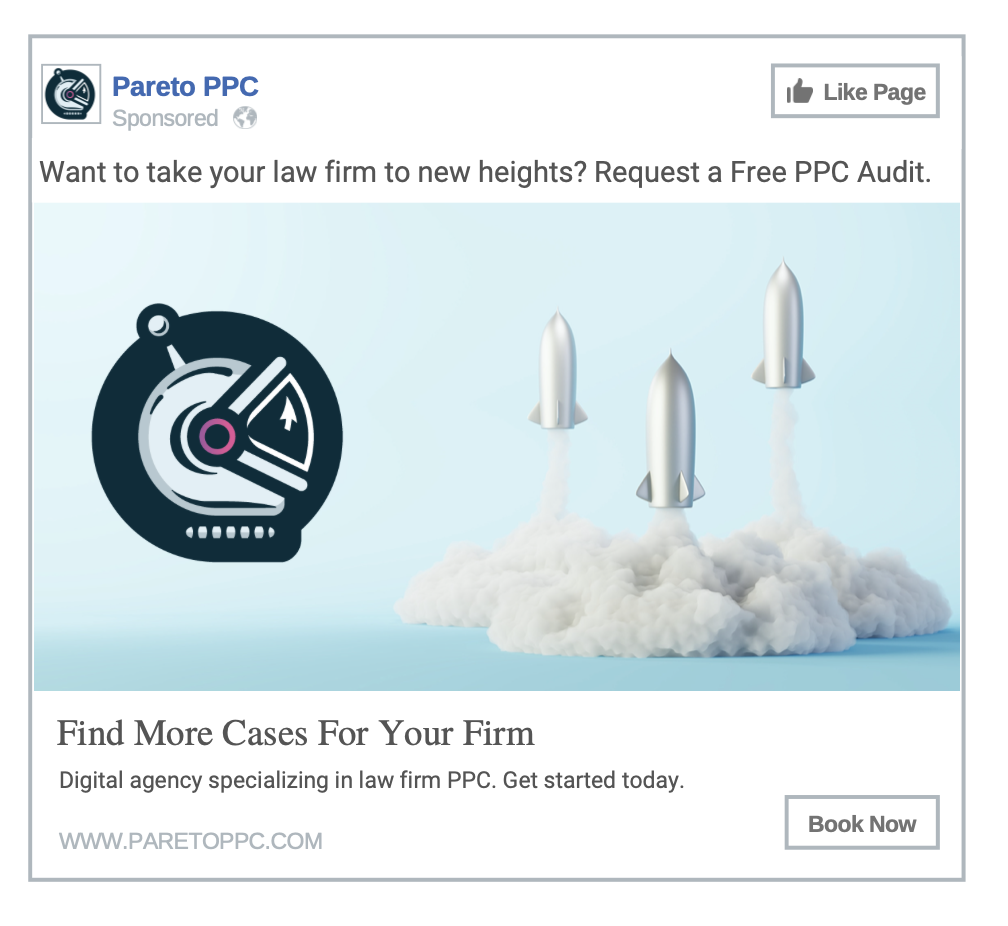Implementing pay-per-click (PPC) advertising can be an effective and highly lucrative marketing strategy for modern law firms.
Personal injury, workers’ compensation, and social security insurance (SSI)/disability lawyers, specifically, can benefit from paid search. Lawsuits in these industries can strike suddenly and without warning. When they do, people need to find answers fast by connecting with the right resources.
When you execute a robust PPC ad campaign successfully, your law firm can show up instantly for potential clients in moments of crisis. By offering the precise solutions people are seeking, you can drive qualified leads straight to your website – ideally to a landing page explicitly addressing visitors’ concerns.
Sounds great, right? Unfortunately, it’s not quite as simple as it sounds. Running a successful PPC campaign requires sound strategy, time commitment, an in-depth understanding of your goals and target market, and, of course, the budget to pay for your ads to show up in the first place.
Throughout this article, we’ll answer the following questions. By the end, you should have a comprehensive overview of PPC advertising for law firms.
- What is PPC advertising?
- What are the best types of PPC ads for lawyers?
- How do Google Ads work?
- What are the top benefits of PPC ads for law firms?
- What are some potential drawbacks of PPC campaigns for lawyers?
- How do I launch an effective PPC campaign for my law firm?
- How do I find the right PPC agency for my law firm?
What Is PPC Advertising?
Pay-per-click, also called paid search or search engine marketing (SEM), is a type of advertising where you pay a certain amount of money every time someone clicks on your ad. PPC ads display on search engines, websites, and social media platforms. Google, Facebook, and Bing are three of the most common platforms for running PPC campaigns.
When someone types in a keyword or search term on Google, for example, and your law firm’s ad is shown at the top of the search results page, the searcher has the opportunity to click and be directed to your website. If your webpage offers a solution for what the visitor is seeking, you could acquire a new, highly qualified lead.
What are the Best Types of PPC Ads for Lawyers?
The four most common types of PPC ads for attorneys are search ads, display ads, paid social, and remarketing campaigns.

1. Search Ads
Search ads are used most often for PPC advertising. You can set up a campaign using Google Ads or Bing. If your campaign is successful, your ad will appear near the top of the search engine results page (SERP) for specific keywords. Search ads on Google and Bing are labeled “Ad.”
Google holds 92.42% of the worldwide search engine market share, and an estimated 70,000 searches happen every second on Google.
2. Display Ads
Display ads appear on websites of businesses that partner with Google through the Google Display Network. These ads can also be found while watching a video on YouTube, checking your mail in Gmail, or using mobile devices and apps. Display ads often feature an image and text to target potential customers.
3. Paid Social Ads

Paid social is another popular type of digital advertising. Platforms like Facebook, Twitter, and LinkedIn allow you to run ads targeted at specific audiences.
- Facebook Ads allow you to set parameters based on user behavior. Facebook ads are useful for building brand awareness and generating new leads.
- Twitter allows you to target specific demographics in your ads and choose how frequently to display your ads.
- LinkedIn lets you target specific keywords and audiences by category. LinkedIn can be a good platform for generating quality B2B leads.
4. Remarketing Campaigns
You can use remarketing (AKA retargeting) campaigns on social, display, and search platforms. Remarketing targets people who have previously searched for similar products or services, or visited your website. You have likely been a target of a remarketing campaign while shopping online when an item you viewed then “follows you” around the Internet or appears on a social media platform after leaving the retail site. Remarketing campaigns pull browser cookie data to place ads that remind you to return to a site you have visited. In the case of law firms, this ad type can be extremely effective at re-engaging with potential clients that you have yet to retain.
—-
NOTE: For the sake of keeping things simple and as relevant as possible, we’ll focus on PPC advertising on Google throughout the rest of this article. Keep in mind, however, that a lot of the information also applies to other platforms.
—-
How Do Google Ads Work?
PPC ads on Google involve an automated auction. Here’s how it works.
The Bidding Process
You have to place bids on keywords you want your ads to display for when setting up your ads.
During the bidding process, you’ll set the maximum amount you’re willing to pay for each keyword and/or click on your ad. The more popular or competitive your keywords are, the more your ads will cost because you’ll be competing with other bidders for the same keywords.
For example, let’s say you want your ad to target people looking for a “personal injury lawyer in Philadelphia.” If someone types that key phrase into Google and you’ve won the highest bid, you have a shot at appearing in one of the top positions on the SERP.
Quality Score
To earn top ad positions on SERPs, Google considers more than your bid. In addition to bidding highest on a keyword, Google considers the “Quality Score” of your ads.
Four things decide Quality Score:
- Expected click-through rate (CTR): How likely is it for someone to click on your ad?
- Ad relevance: Does your ad match user intent?
- Your landing page: Is it clear, relevant, and easy to navigate?
- Historical performance: How well have your Google Ads performed in the past?
Google will reward you for having high-quality ads by granting you better positioning, opportunities to use new ad formats or ad extensions, and lower costs-per-click.
Here’s a word of advice from Google: “Give your users what they need, and a great Quality Score should follow.” In other words, don’t obsess over the metrics. Keep them in mind, but prioritize giving your customers exactly what they’re looking for.
What are the top benefits of PPC ads for law firms?
Here are some of the primary advantages of PPC ads for personal injury, workers’ comp, and SSI/disability lawyers.
- Highly targeted: You can set specific parameters for your target audience, location, and keywords you want your ad to appear for based on user intent.
- Easy to set up, track, test, analyze, and adjust: Setting up PPC ads is a straightforward process if you’re familiar with the platform you’re using. Google makes it easy to track and analyze results so you can make adjustments as needed. You can also test different versions of your ads to see what performs best.
- Fast results: Wordstream found that 64.6% of people looking to shop online click on Google Ads. And, ads have the potential to appear in search results immediately after they go live – so you can begin acquiring leads and clients quickly.
- Prominence: PPC ads often appear at the very top of a SERP, stealing the top three or four positions on a page.
- Control: You make the calls. Choose what keywords you want to bid on, how much you want to spend on advertising, and whom you want to target.
- Brand awareness: Most people are more likely to click on a familiar brand than a new one. Having your law firm appear at the top of search results consistently can help you build brand recognition and trust with potential clients.
- ROI: Google’s latest Economic Impact Report estimates that advertisers, overall, receive in profit eight times the amount they spend on Google Ads.
- Competitors are doing it: Competition is fierce for attorney and law firm advertising, but that also means your competitors are out there fighting for top positions. If their ads are showing up and yours aren’t, potential customers may go straight to your competitors.
What are some potential drawbacks of PPC campaigns for lawyers?
PPC advertising isn’t for everyone. While it has the potential to bring in countless leads and massive ROI, it requires astute technical know-how and the time to test and adjust campaigns as they run. Here are some potential disadvantages.
- Cost: Paying for every click on your ad can get expensive, especially when you’re bidding on costly keywords. Specific law-related keywords are among the most expensive on Google (“Houston maritime attorney” costs $1,090 per click!).
- Fierce competition: This goes hand in hand with cost. The more competitive a keyword is, the more it will cost you to outbid other law firms.
- People can be wary of ads: Some people are apprehensive about clicking on ads and opt for organic search results.
- Required upkeep: You can’t just set up an ad and forget about it if you want it to perform well. It requires ongoing maintenance, testing, and adjusting to find your sweet spot.
How do I launch an effective PPC campaign for my law firm?
Here’s an overview of how to launch a successful PPC campaign.
1. Understand your goals and target market.
Before you get into the weeds of building your ads, you need to have a firm grasp on whom you’re targeting and what your overarching goals are.
Develop buyer personas – fictional representations of your ideal customers. Ensure you do enough research and conduct surveys or interviews to fill out your buyer persona profiles accurately. Here are some essential questions to answer:
- Who is your ideal customer?
- What are their age, gender, and income?
- Where do they live and work?
- What do they value most?
- What problems are they trying to solve?
- How can your services be the ideal solution to their problems?
- How much are they willing to spend on services like yours?
- What online platforms do they use?
- What topics are they searching for online?
Once you understand whom you’re going to target, you should set some SMART (specific, measurable, attainable, relevant, and time-based) goals for your PPC campaign. Let’s say you primarily deal with workers’ compensation cases. An example of a SMART goal could be to generate 30 new workers’ comp leads in Q1.
2. Determine your budget.
How much are you willing to spend on your PPC campaign? When setting up your ads, you’ll set a daily or monthly spend limit. A word of advice? Start small, see how it goes, build on what works, and get rid of what doesn’t. You should also factor in your average case value when determining your PPC budget: for example, if your average case value for a social security disability case is $4,000 and your goal is to generate 10 SSD cases per month, it wouldn’t make sense to invest $45K/month into your SSD advertising campaign.
3. Pick and test different advertising channels.
While you may find success advertising on social channels like Facebook or LinkedIn, law firms often focus on Google search, Facebook ads and display ads to prospect for new clients. That said, we typically recommend that our clients test several different advertising platforms concurrently and allocate budget to the channels accordingly pending initial results
4. Do keyword research.
Identify relevant words or phrases that your buyer persona is typing into Google to find a law firm like yours. Consider using tools like Ahrefs, SEMrush and Keyword Planner to identify specific, highly relevant keywords.
Remember, the more competitive a keyword is, the more expensive it will be to bid on it. Usually, the more specific the term is, the less expensive it will be. Also, keep in mind that keywords for law firms are often location-based.
5. Build relevant, no-nonsense landing pages.
When someone clicks on your ad, make sure they’re sent directly to a landing page on your website. The page should be clear, concise, and give them exactly what they’re seeking. Landing pages should aim to convert visitors into leads by persuading qualified individuals to take a specific action, such as filling out a form with their contact information or calling you directly.
If you have multiple ads running for different personas (e.g., someone looking for a personal injury attorney and someone looking for a lawyer to help with a police brutality matter), you’ll need two separate landing pages that speak to each practice area.
6. Write compelling copy.
On Google, you should build at least three different ads for every ad set. You don’t need to go back to the drawing board for every ad. Instead, tweak the copy and design to make each one unique. You’ll be able to see which ad performs best and why. Your goal is to stand out, grab the attention of your ideal customer, and compel prospects to click through to your website.
7. Launch, monitor, and adjust.
Once you properly set up your ads, it’s time to go live. Start by bidding on a few keywords that are highly relevant to your audience (e.g., personal injury lawyers near Philly). Check in regularly to see how your ads are performing and where you need to make adjustments.
Click here for 4 strategies we use to optimize PPC campaigns.
How Do I Find the Right PPC Agency for My Law Firm?
According to Disruptive Advertising’s CEO, 61% of Google Ads budgets get wasted completely. If you don’t have a PPC expert in house, it’s imperative to find and partner with the right agency.
Make sure you choose an agency that specializes in PPC advertising and is Google Ads certified. Working with an agency that also understands the world of law can push you ahead of your competitors. Before hiring, ask to see some case studies and testimonials showing what types of clients the agency has worked with in the past and the kinds of results they found.
A qualified, experienced PPC agency can help you determine what you’re already doing well, identify holes you need to fill, and help you develop strategies to reach your SMART goals successfully.
About Pareto PPC
Pareto PPC is a digital advertising agency specializing in digital strategy, pay-per-click marketing, and analytics for online businesses. Our sole focus is to make our legal clients more money by using proven PPC channels and tactics that actually move your business’ needle.
If your legal business’ digital growth has stalled, you’re lacking strategic direction, or you’re just looking for a partner to bring your business to new heights, schedule a free consultation with one of our law firm experts. You’ll get a free, no-obligation PPC account audit and, at the very least, will walk away with knowledge and recommendations for how to grow your business online.




